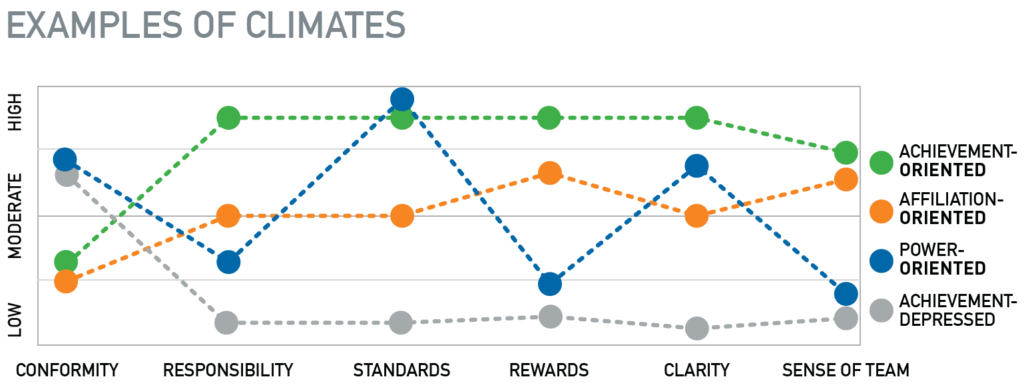By Bradford F. Spencer
Let’s start by taking a look at where you want to be:
Achievement-Oriented Climates
Defined by goal-oriented behavior in an environment where Responsibility, Standards, Rewards, and Clarity are all high. As a result, Sense of Team is also high.
Here’s how to recognize you’re on the right track:
- There is a strong bias toward doing things better, faster, and more efficiently. Consistent improvement (3-foot-throws in Motivating Achievement lingo) is the norm.
- Managing feedback processes and post-mortems are an everyday, high priority activity that can be counted upon. “What have we learned?”
- Planning time can be counted upon. The focus is on working the plan, not on the outcome.
- Rewards are given for progress toward goals and not only goal-attainment.
- Positive behaviors that contribute to company results are recognized and rewarded and exceed corrective feedback.
- Commitment among members is felt equally.
- People are actively seeking feedback.
- Problems are approached systematically.
- People take Responsibility for their own Clarity (and security).
- There is a value present that failure is the best teacher. People are allowed to learn from their failures.
- Individual and group development is consciously taking place.
- People feel safe to say what is on their mind. People feel safe to ask for help.
- People can say “now” and know how to do it appropriately.
- There is a strong bias to overcome differences and find the “mutual self interest.” Win/win is found, not just talked about.
- There is a sense of urgency that keeps people awake, excited, and energized.
- There is a conscious awareness of strengths and weaknesses (as a team and individually) with a focus on blending the strengths.
- People are put into roles where they are able to thrive.
- Stress is associated with meaning in life. “Why we are doing what we are doing” is associated with a vision.
- Emotion is controlled. Passion is present.
Here are signs that
things are going amiss:
Affiliation-Oriented Climates
Defined by a greater concern for the relationships of the team than for the goals of the team.
Keep an eye out for these early symptoms:
- Goals are set as slam-dunks or people are not held accountable to the goal.
- Standards cause stress or emotional tension. Excuses are allowed, which diminishes Standards.
- Conformity is valued because it is equated with security.
- Leaders feel responsibility for their people over everything else.
- People do not come to work with an eye toward new responsibilities they can take on. Instead, people come to work to be with the people, to be helpful or supportive to others.
- People feel intense loyalty to others in the company.
- Post-mortems are glossed over. Learning opportunities are avoided because they might upset individuals or make them feel bad.
- The focus is the future (hope). People issues take precedence over the goal. Rewards focus on people-related concerns.
- Harmony is the most important norm.
- Process is emphasized at the expense of task.
- Conflict is avoided and differences are ignored.
- Resistance is passive. If made public, it is minimized.
- Interactions are overly respectful (deferring) without candor.
- Commitments are made too easily and often not met.
- People are rescued and not allowed to feel accountable.
- Sympathy exceeds empathy.
- Risk is scary.
- Commitment is somewhere other than the goal (toward relationships).
Power-Oriented Climates
Defined by control and compliance. Driven by fear of failure and its implications.
Keep an eye out for these early symptoms:
- Goals and Standards are unreachable.
- Goals are set without regard to outcomes or stakeholders.
- Conformity can reach stifling levels.
- Responsibility is felt at the top only. It’s not likely felt by, or even wanted by, anyone else in the organization.
- Punishment and negative reinforcement outweigh positive rewards.
- Post-mortems are pointed and taken personally.
- The end justifies the means.
- Ambiguity is consciously pursued and clarity is avoided.
- Communication is oblique and non-direct.
- Emotion is out of control, often made personal, and used to manipulate.
- Self-regard is the norm. Self-aggrandizing comments are heard frequently.
- Individual needs and success takes precedence over what is best for the team.
- Resistance is aggressive.
- Blaming and defensiveness take precedence over “seek first to understand.”
- Resistance is aggressive.
- Information is guarded.
- Risk equals excitement (risk for risk’s sake).
- The focus is the past.
- “No” does not mean win/win.

